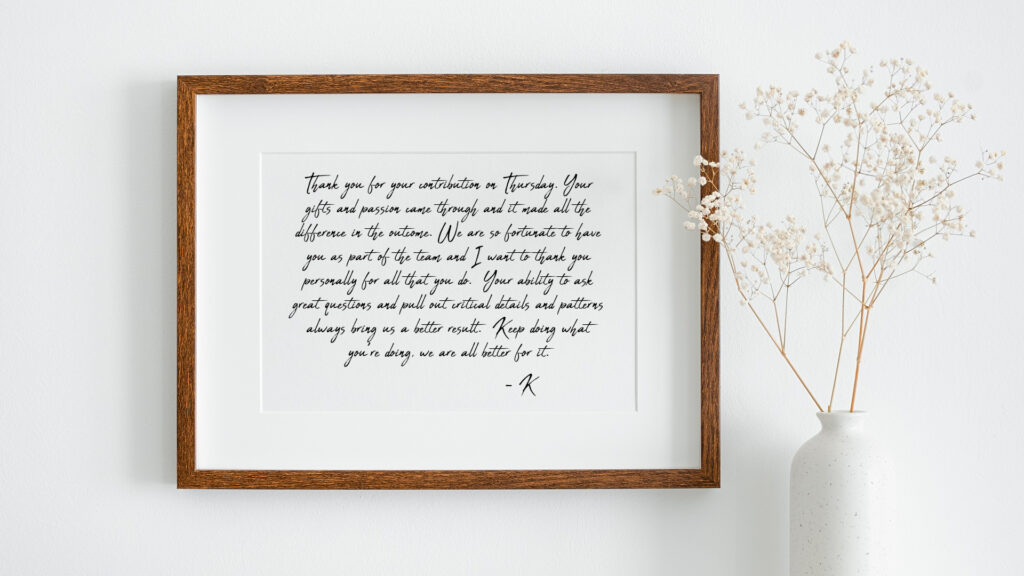How would you feel if you found out that an employee had framed a handwritten note from you? That it was so meaningful to them, they wanted to cherish that memory every day? It would be enough to make you pause and want to sit with the emotion that went into that gesture.
Do you have any love notes or other handwritten notes that you’ve kept and reread occasionally to re-feel the emotions? How do you feel when you hold them, look at them, reread them, and remember the person who wrote them?
When someone handwrites a note, it means that they’re taking the time to get a card or find some paper, sit down, grab a pen, and think about you. And with some presence and intention, they choose their words carefully and write them out, letter by letter, to let you know how they’re thinking about you. And then they sign it. And put it in an envelope. And seal the envelope. And address the envelope. And put a stamp on it. And mail it. They’re choosing to do every one of those steps instead of sending you an email, text, or voicemail. They’re choosing to spend time on you. Extra time.
That’s why it’s so meaningful. It stands out in a life filled with electronic communication, and we feel seen. Really seen. Of all the things this person could choose to spend their time on, they spent time on you. Wow. Just Wow.
As leaders, we aspire to connect with our employees for many reasons—mostly because as humans we’re wired for interaction and because it makes collaboration more enjoyable. What’s more, the science behind connecting by way of showing appreciation—especially in written form—means that we’ll be physically and emotionally healthier.
The first time former Home Depot CEO Frank Blake saw one of his notes framed on an employee’s wall, he knew then that he should double his efforts. Blake estimates that he wrote more than 25,000 notes to employees ranging from district managers to hourly associates. He’d spend a few hours every Sunday writing something specific he was grateful for in what he observed or learned about an employee.
Bestselling author and former CEO of Guardian Life Insurance Deanna Mulligan is another leader who reflected on the power of writing notes of a different kind to her employees. When one of her employees experienced a loss in the family at GLI, she would go out of her way to identify a cause that was relevant to her employees and make a donation in their loved one’s honor. Then she’d write a note, sharing the gesture and expressing her personal condolences, and sign the note with her name and her husband’s. To this day, she still hears from employees who say, “I’ll never forget when I received your note …”
Former CEO of Comcast’s West Division Steve White shares in his book, Uncompromising, a memorable story about the impact that handwritten notes had on him. Steve’s coworkers threw a baby shower for Steve and his wife, Barbita, and gave him what he said was one of the most powerful gifts he had ever received. “The group had given me a beautiful box that held notes from everyone on my leadership team. Each note was addressed to [my son] Stevie and contained heartfelt messages that highlighted things they appreciated about his father,” said Steve.
Frank, Deanna, and Steve are not alone in their appreciation for the written word. They share company with other leaders who’ve cast aside their digital devices for handwritten notes, such as Virgin Group’s founder Richard Branson, bestselling author J.K. Rowling, Starbuck’s former CEO Howard Schultz, Nobel Peace Prize laureate and activist Malala Yousafzai, Berkshire Hathaway’s Warren Buffett, and singer-songwriter Taylor Swift.
While the positive influence of handwritten notes or letters causes positive ripple effects we can’t begin to estimate, some letters also defy the test of time. Martin Luther King’s 1963 letter from Birmingham Jail is a classic document of the Civil Rights Movement and something I like to read once a year so I don’t forget our history. Every year I read it I wonder what it was like to sit in jail and write a letter from the heart that, to this day, inspires us to continue to fight for justice.
We never know when our words are the very thing that can make the difference in someone’s life. A note touches the heart and reminds us that we matter. Our work, our life, and our efforts matter. Sometimes we really need to hear that, and our letter may arrive on the day someone needs it the most.
I’d love to encourage you to sign up for my 30-Day Note-Writing Challenge. I’ll send you a week’s worth of prompts for four weeks. Have fun with it, go out and buy new stationery or cards, make sure you have enough stamps, and grab your favorite pen.
I have a friend who creates a Zentangle or tiny watercolor every day and then uses that as her card to send a note to a friend. It’s her morning ritual. Schedule it on your calendar. It takes just five to ten minutes a day. I promise you that you’ll get as much out of it as your recipients do. Slowing down to express appreciation changes the wiring in our brains, which changes the way we look at and appreciate life. Join me and sign up today. I’d love to hear the reactions you receive and how the practice affects you.

